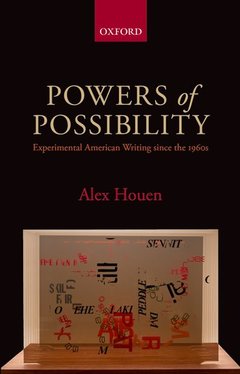Description
Powers of Possibility
Experimental American Writing since the 1960s
Author: Houen Alex
Language: English
Powers of Possibility
Publication date: 12-2014
294 p. · 14x21.6 cm · Paperback
Publication date: 12-2014
294 p. · 14x21.6 cm · Paperback
Powers of possibility: experimental american writing since the 1960s (hardback)
Publication date: 12-2011
296 p. · 14.6x22.1 cm · Hardback
Publication date: 12-2011
296 p. · 14.6x22.1 cm · Hardback
Description
/li>Contents
/li>Biography
/li>
In The Meaning of Contemporary Realism (1957) Georg Lukács discussed how the power struggle of the Cold War made it all the more pressing for literary writers to present 'concrete potentialities' of individual character in novel ways. Powers of Possibility explores how American experimental writers since the 1960s have set about presenting exactly that while engaging with specific issues of social power. The book's five chapters cover a range of writers, literary genres, and political issues, including: Allen Ginsberg's anti-Vietnam War poems; LeRoi Jones/Amiri Baraka and Black Power theatre; William S. Burroughs's novels and the Space Programmes; Kathy Acker's fiction and Biopolitics; and Lyn Hejinian, Language poetry, and the Cold War. Each chapter examines how relations of character and social power were widely discussed in terms of potentiality: Black Power groups, for example, debated the 'revolutionary potential' of African Americans, while advances in the space programmes led to speculation about the evolution of 'human potential' in space colonies. In considering how the literary writers engage with such debates, Alex Houen also shows how each writer's approach entails combining different meanings of 'potential': 'possible as opposed to actual'; 'a quantity of force'; a 'capacity' or 'faculty'; and 'potency'. Such an approach can be characterised as a literary 'potentialism' that turns literary possibilities (including experiments with style and form) into an affective aesthetic force with which to combat or reorient the effects of social power on people. Potentialism is not a literary movement, Houen emphasises, so much as a novel concept of literary practice-a concept that stands as a refreshing alternative to notions of 'postmodernism' and the 'postmodern avant-garde'.
Introduction. 1. 'Back! Back! Back! Central Mind Machine Pentagon. . .': Allen Ginsberg and the Vietnam War. 2. 'This Black World of Purest Possibility': LeRoi Jones / Amiri Baraka. 3. Writing Outer Space for 'Potential America': William S. Burroughs. 4. Novel Biopolitics: Kathy Acker and Michel Foucault. 5. Making a Person Possible: Lyn Hejinian and Language Poetry. 6. Conclusion: Potentialism and Practical Imagination. Bibliography. Index.
Alex Houen is a University Lecturer in Modern Literature, and Fellow of Pembroke College, University of Cambridge. He is the author of various articles on literature and political violence, modernism, postmodernism, sacrifice, and theories of affect. He is co-editor of the online poetry journal Blackbox Manifold
© 2024 LAVOISIER S.A.S.




